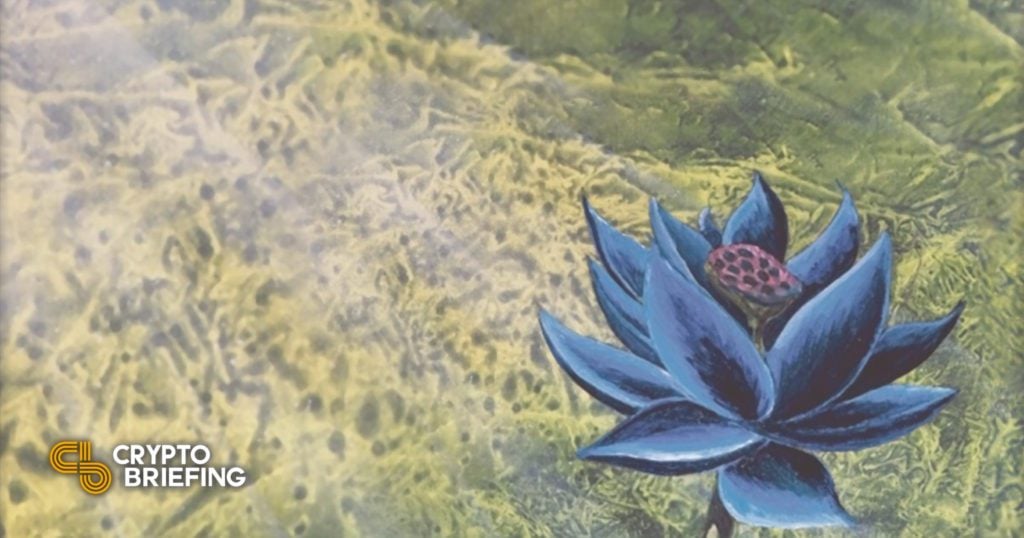
Cover image by Magic: The Gathering/Wizards of the Coast
Magic: The Gathering Threatens Action Over Destroyed Card NFTs
A crypto fan created an NFT collection out of a destroyed a Black Lotus Magic: The Gathering card. However, the trading card game's creator has pushed back against the collection.
A crypto enthusiast has destroyed an ultra-scarce Black Lotus Magic: The Gathering trading card. Now, he wants to memorialize it on the blockchain as an NFT—but the intellectual property rights owners aren’t happy.
Rare Magic: The Gathering Card Turned Into NFT
More valuable items are being destroyed and turned into NFTs. This time, it’s not a Banksy piece, a diamond, or a Lamborghini—but a rare collectible from the popular trading card game Magic: The Gathering.
A crypto enthusiast who posts under the pseudonym notsofast on Twitter has received a Digital Millennium Copyright Act takedown notice after he destroyed a Black Lotus card to create his own NFT collection.
The idea was simple: destroy something valuable and make NFTs of it that will live on the blockchain forever. The project, known as “Lotus,” began in February when notsofast destroyed his $20,000 Black Lotus card in a “ceremony” video posted to the Lotus NFTs website and YouTube.
notsofast had planned to offer 10,000 NFTs commemorating the card in an Ethereum-based crowdfunding campaign. Interested buyers would need to contribute ETH to receive one of the NFTs. However, before notsofast and his team could progress to minting the NFTs, the project was contacted by Wizards of the Coast, the company that owns the copyright to the Magic: The Gathering franchise. Wizards of the Coast was concerned that notsofast’s project was using intellectual property that they didn’t own the rights to.
notsofast explained in follow-up tweets that the project has since received a Digital Millennium Copyright Act takedown notice relating to pages on the project’s website. He assured those who had contributed to the project that none of the images or content on the site contained any copyrighted material. As of Mar. 3, the project is still deliberating on how to proceed in light of the DMCA takedown request.
The concept of destroying things in order to mint them as NFTs isn’t new; last year, a group of NFT enthusiasts burned an original Banksy piece and sold an NFT version for $380,000. The crypto commentator Tascha Labs pulled a similar stunt with a $5,000 diamond that has since sold for around $20,000. And just last month, Shl0ms blew up a $250,000 Lamborghini Huracan to create 999 film fragments of the car as NFTs.
While others have profited from turning valuable real-world items into NFTs, notsofast has suggested that he isn’t setting out to make money from destroying the rare Black Lotus card. “We destroyed it to spark the telling of a story,” he tweeted in response to one user who questioned whether notsofast had destroyed his valuable card for nothing.
Whether the Lotus NFT project will be able to continue is not yet clear. While Wizards of the Coast do not appear to own any of the artwork used by the project, the Black Lotus card has become synonymous with Magic: The Gathering. As such, Wizards of the Coast will likely fight anyone who could potentially make money using the concept of the Black Lotus card, even if it doesn’t technically intrude on the company’s intellectual property.
As NFTs soar in popularity, disputes over intellectual property rights surrounding them are increasing. At the start of February, sportswear giant Nike filed a lawsuit against the sneaker marketplace StockX. Nike claimed that StockX was minting NFTs of its shoes without the company’s authorization or approval. Larva Labs has also fought hard to block derivatives of its most popular NFT collection, CryptoPunks.
Disclosure: At the time of writing this feature, the author owned ETH and several other cryptocurrencies.
